hpdsigns.nyc
Bulletin to Property Owners – June 2022 (pdf file)
- SKU:
- UPC:
- MPN:
- Bulletin to Property Owners – June 2022
Description
Bulletin to Property Owners – July 2022 will cover:
1) self closing doors and penalties
and
2) fire safety Notice
1) New York City Local Law 62 of 2022: Self-Closing Door Requirement and Installation
New York City Local Law 62 of 2022, a crucial measure aimed at enhancing fire safety in multifamily residential buildings, mandates the installation of self-closing doors. This law is part of the city's broader effort to protect residents and improve building safety standards.
Overview of Local Law 62
Local Law 62 of 2022 requires that all self-closing doors in residential buildings with three or more dwelling units must be properly installed and maintained. This regulation is designed to prevent the spread of fire and smoke, providing residents with crucial additional time to evacuate safely in the event of a fire.
Key Provisions
-
Scope and Applicability:
- The law applies to all residential buildings with three or more dwelling units.
- All doors leading to corridors or stairwells must be self-closing.
-
Installation Requirements:
- Property owners must ensure that all self-closing doors are installed by a qualified professional.
- Doors must close and latch automatically when released from any open position.
- Installation must comply with the New York City Building Code and the New York City Fire Code.
-
Maintenance and Inspection:
- Regular maintenance checks must be conducted to ensure that self-closing mechanisms are functioning correctly.
- Any malfunctioning doors must be repaired or replaced promptly to maintain compliance.
Importance of Self-Closing Doors
Self-closing doors are a critical component of fire safety in multifamily residential buildings. They help to contain fires by preventing the spread of flames and smoke, thereby limiting property damage and providing residents with valuable time to evacuate. Properly functioning self-closing doors can make the difference between a contained fire and a rapidly spreading disaster.
Installation Process
-
Assessment and Planning:
- A thorough assessment of the building is conducted to identify all doors that require self-closing mechanisms.
- A detailed plan is developed to ensure compliance with the law, taking into account the specific needs and layout of the building.
-
Selection of Equipment:
- High-quality self-closing devices that meet the standards set by the New York City Building Code are selected.
- The chosen devices must be durable and reliable to ensure long-term functionality.
-
Professional Installation:
- Qualified professionals are hired to install the self-closing mechanisms.
- The installation process includes adjusting the door and the self-closing device to ensure smooth and effective operation.
-
Post-Installation Inspection:
- After installation, a thorough inspection is conducted to verify that all doors close and latch properly.
- Any necessary adjustments are made to ensure full compliance with the law.
Compliance and Penalties
Building owners are responsible for ensuring that all self-closing doors are installed and maintained in accordance with Local Law 62 of 2022. Failure to comply with this law can result in significant fines and penalties. Regular inspections by the New York City Department of Buildings will help ensure ongoing compliance.
Conclusion
New York City Local Law 62 of 2022 underscores the city's commitment to enhancing fire safety in residential buildings. By mandating the installation and maintenance of self-closing doors, the law aims to protect residents and minimize the risk of fire-related injuries and fatalities. Building owners must take proactive steps to comply with this law, ensuring the safety and well-being of their tenants.
2) NYC Fire Safety Notice: Ensuring Resident Safety through Increased Inspections
As part of New York City's ongoing efforts to enhance fire safety in residential buildings, the Department of Housing Preservation and Development (HPD) has announced a new initiative aimed at ensuring compliance with the NYC Fire Code. Beginning in June, HPD inspectors will be checking the inside of apartment doors for the required FIRE SAFETY NOTICE during the course of all apartment inspections. This move underscores the city's commitment to protecting residents and preventing fire-related tragedies.
The Importance of the Fire Safety Notice
The FIRE SAFETY NOTICE is a crucial component of the NYC Fire Code, designed to provide residents with vital information on how to respond in the event of a fire. The notice includes instructions on fire prevention, emergency procedures, and evacuation plans, tailored to the specific building. By having this information readily available, residents can act quickly and efficiently during an emergency, potentially saving lives and minimizing injuries.
Key Provisions of the Initiative
-
Inspection Procedures:
- During all apartment inspections, HPD inspectors will now include a check for the FIRE SAFETY NOTICE on the inside of apartment doors.
- Inspectors will ensure that the notice is posted in a visible and accessible location, as required by the NYC Fire Code.
-
Compliance Requirements:
- Property owners and building managers are responsible for ensuring that the FIRE SAFETY NOTICE is posted on the inside of every apartment door.
- The notice must be up-to-date and clearly legible, providing residents with accurate information.
-
Penalties for Non-Compliance:
- Failure to comply with the posting requirement can result in fines and other penalties.
- Property owners may be required to take corrective actions immediately to bring their buildings into compliance.
Steps for Property Owners
To prepare for the upcoming inspections and ensure compliance with the NYC Fire Code, property owners and building managers should take the following steps:
-
Verify Current Notices:
- Conduct a thorough inspection of all apartment doors to ensure that the FIRE SAFETY NOTICE is posted correctly.
- Check that the notice is legible and contains up-to-date information.
-
Replace Missing or Damaged Notices:
- If any notices are missing, damaged, or outdated, replace them promptly.
- Ensure that the new notices meet the standards set by the NYC Fire Code.
-
Educate Residents:
- Inform residents about the importance of the FIRE SAFETY NOTICE and encourage them to familiarize themselves with its contents.
- Provide additional fire safety resources and conduct fire drills if possible.
The Role of Residents
Residents also play a crucial role in maintaining fire safety within their buildings. By paying attention to the FIRE SAFETY NOTICE and following its guidelines, they can contribute to a safer living environment. Key actions residents can take include:
-
Review the Notice:
- Read and understand the FIRE SAFETY NOTICE posted on the inside of their apartment door.
- Familiarize themselves with emergency procedures and evacuation routes.
-
Report Issues:
- Notify building management if the FIRE SAFETY NOTICE is missing or damaged.
- Report any fire safety hazards or concerns to the appropriate authorities.
Conclusion
The new initiative by HPD to check for the FIRE SAFETY NOTICE during apartment inspections is a vital step in reinforcing fire safety standards across New York City. By ensuring that this critical information is readily available to all residents, the city aims to enhance preparedness and reduce the risk of fire-related incidents. Property owners, building managers, and residents must work together to comply with the NYC Fire Code and prioritize fire safety. Through these collective efforts, New York City can continue to protect its residents and create a safer living environment for all.
DISCLAIMER these codes may not be the most recent version. The State / federal or other regulation department may have more current or accurate information. We make no warranties or guarantees about the accuracy, completeness, or adequacy of the information contained on this site or the information linked to on the state site. Please check official sources. The requirements for detector are determined by intended use and by applicable regulation. The BUYER is responsible for determining the appropriate detector needed. WE make no warranty or representation of suitability of a detector to any code or for any specific application. IT IS THE CUSTOMER'S RESPONSIBILITY TO ENSURE THAT THE DETECTORS THE CUSTOMER ORDERS ARE IN COMPLIANCE WITH ALL STATE, FEDERAL, LOCAL, AND MUNICIPAL LAWS. Please review terms and conditions prior to purchase. For more information about what is required, see the laws that are referenced and the rules applicable to your city and state. This page is for informational purposes only and is not intended as legal advice, professional advice or a statement of law. You may wish to consult with an attorney.
Related Products

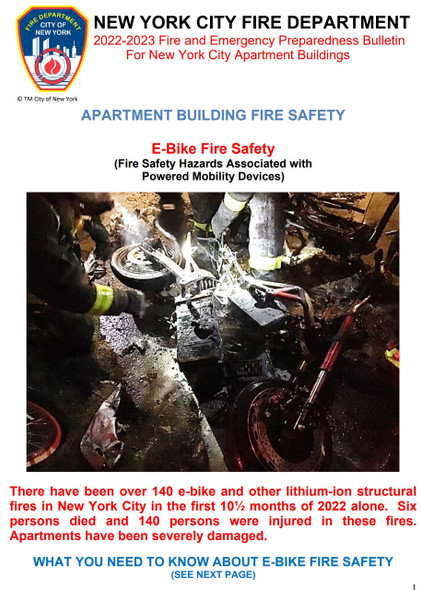
FIRE EMERGENCY PREPARDENSS BULLETIN 2022-2023 (PDF FILE)
hpdsigns.nyc
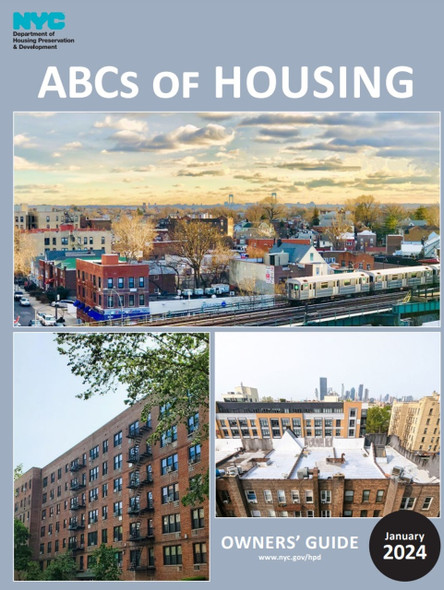
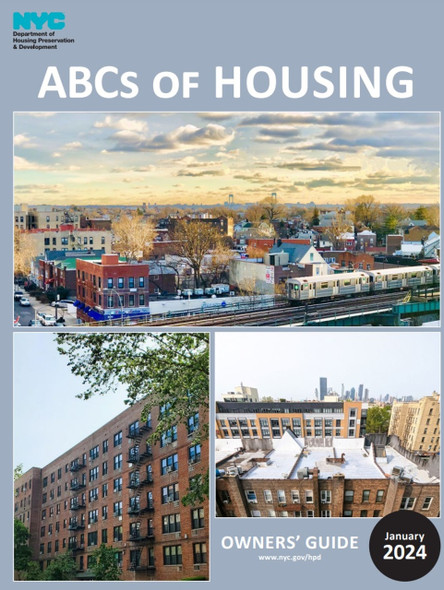
hpd abc's of housing owner's guide 2024 (PDF FILE)
hpdsigns.nyc
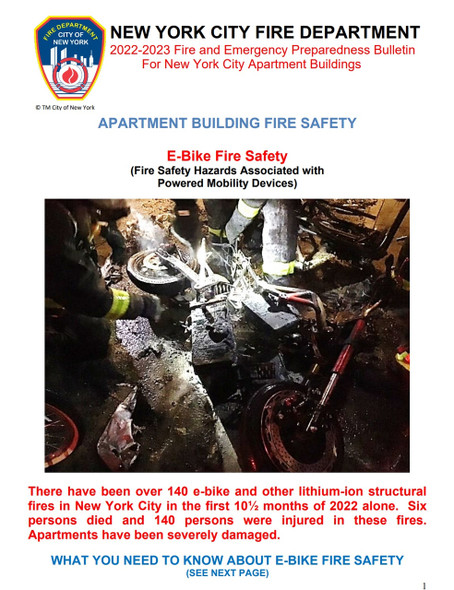

E-Bike Fire Safety Bulletin NYC(pdf file)
hpdsigns.nyc

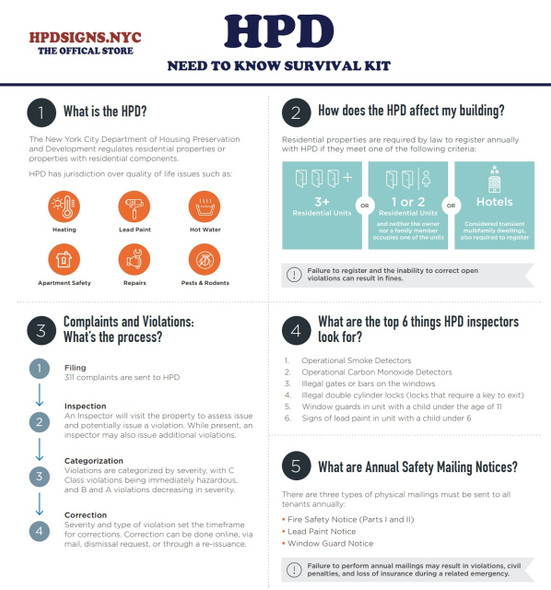
Property Managment need to know HPD Survival kit (pdf file)
hpdsigns.nyc

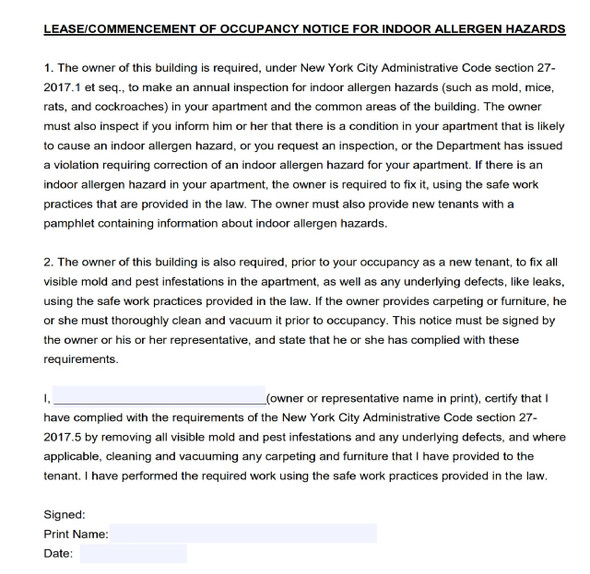
Lease riders for owner (pdf)
hpdsigns.nyc

